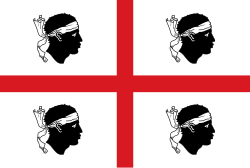| |||||||||||||||||||||||||||||||
All 80 seats to the Regional Council of Sardinia | |||||||||||||||||||||||||||||||
|---|---|---|---|---|---|---|---|---|---|---|---|---|---|---|---|---|---|---|---|---|---|---|---|---|---|---|---|---|---|---|---|
| Turnout | 66.3% ( | ||||||||||||||||||||||||||||||
| |||||||||||||||||||||||||||||||
| |||||||||||||||||||||||||||||||
 |
|---|
|
The Sardinian regional election of 1999 took place on 13 and 27 June 1999.
The centre-right coalition led by Mauro Pili won the election but was short of a clear majority; Pili, who was appointed President of the Region was not able to form a majority and was soon replaced by the defeated candidate, Gian Mario Selis, who was not able to win the confidence vote of the Regional Council himself. The former President Mario Floris was asked to form a government avoiding a new regional election.

